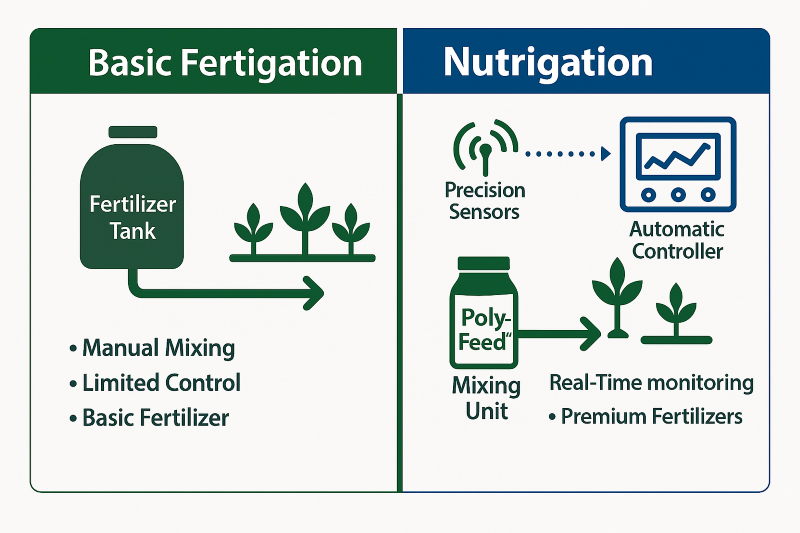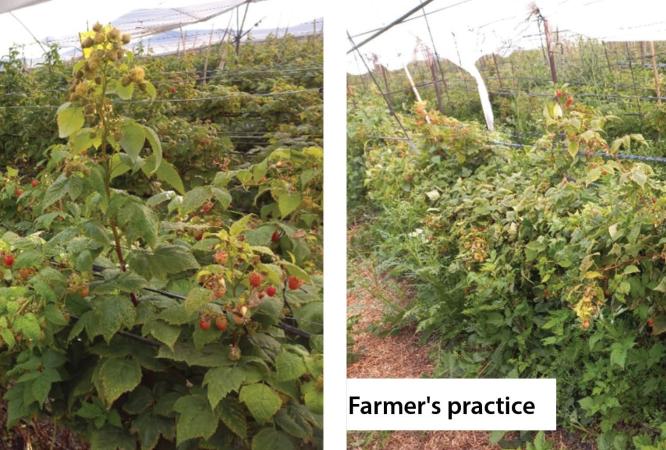Fertigation is an innovative agricultural practice that involves applying fertilizers through irrigation systems, ensuring efficient and targeted nutrient delivery directly to plant roots. This technique seamlessly combines two essential processes—fertilization and low-flow irrigation—into one operation, optimizing both plant nutrition and water use efficiency.

While fertigation refers to the general practice of applying fertilizers through irrigation, Nutrigation™ is Haifa's advanced approach to fertigation in agriculture. Nutrigation™ integrates fertigation with expert agronomic planning, precision application, and premium fertilizers specifically designed for this method.
Benefits of Fertigation
The benefits of fertigation as an enhanced fertilizer application method include:
Improved Nutrient Use Efficiency: Precise application reduces wastage and ensures that plants receive the exact nutrients they need.
Flexibility: Fertigation systems can be tailored to different plant growth stages, providing the right nutrients at the right time.
Reduced Environmental Impact: Fertigation minimizes runoff and leaching, protecting the environment.
Cost-Effectiveness: Fertigation farming lowers labor and application costs, making it a more economical choice for growers.
These benefits lead to better financial returns for growers and support sustainable practices by minimizing nutrient runoff and environmental impact.
Evolution of Fertigation Practices
Fertigation began to develop rapidly in the late 1960s with the advent of the micro-irrigation revolution, including drip and micro-sprinklers irrigation. Initially, fertigation systems consisted mainly of a fertilizer tank and simple injection pumps. However, with technological advancements, today's fertigation equipment includes sensors, precise electric injection pumps, and computerized automatic fertigation controllers, allowing for accurate nutrition suitable for every stage of plant growth.
Alongside technological development, the fertilizers used for fertigation have evolved to meet the demand for more efficient and cleaner fertilizers suitable for micro-irrigation. Haifa, one of the pioneers in fertigation farming, developed clean fertilizers based on potassium nitrate, with nutrient-concentrated formulas adapted to different growth stages and richer in nutrients, such as Poly-Feed 20-20-20 fertilizer.
Haifa's water-soluble fertilizer (WSF) product line features a comprehensive range of premium, fully water-soluble fertilizers tailored for fertigation. Made exclusively from pure nutrients, Haifa’s WSF ensures complete absorption without any residue. These fertilizers are free from chloride, sodium, and other harmful elements.
Initially, fertigation was primarily used in limited crop production. However, advancements in technology and agricultural practices have significantly expanded their application. The numerous benefits of fertigation have led to its widespread adoption across various agricultural sectors because of these advantages:
Open Field Vegetables: Vegetables are a valuable cash crop, and growers need high yields and quality to maximize income. Tailoring nutrition to the plant's needs at each growth stage ensures these goals are met. Haifa products Multi-K, water-soluble fertilizers, and Poly-Feed with specialized formulas, tailored to the various growth stages of crops, offer a precise and convenient fertilization option.
Greenhouse and Protected Crops: To achieve profit in this sector, it is crucial to maximize both the quantity and quality of produce from each growing area. Fertilization with special water-soluble fertilizers, Haifa Micro and HaifaStim, achieves these goals by:
Precisely applying nutrients, tailored to the plant's needs at each growth stage (Poly-Feed formulas).
Offering flexibility to adjust the nutrient composition in the fertilizer as required (like adding calcium nitrate or micronutrients according to the needs).
Controlling the nitrate/ammonium ratio in the fertilizer, ensuring optimal nutrient balance for the plants.
Soilless Culture: Soilless culture systems require high precision in nutrient content concentration and pH control in the irrigation solution. Due to the sensitivity of these systems, inaccuracy with these parameters can cause damage. Haifa’s high-quality water-soluble fertilizers enable this accuracy. Haifa’s products are most suitable for soilless culture due to precise nutrient application and the ability to adjust the irrigation solution pH with phosphoric acid.
Hydroponic Systems and Water Recycling Systems: Haifa products are particularly effective in hydroponic systems and water recycling systems because Haifa soluble fertilizers consist only of nutrients and do not accumulate in water. The purity of the fertilizers prevents substances such as sodium and chlorine from accumulating in the water. HaifaStim products can enhance crop health and productivity, thereby increasing profitability.
Orchards: Precision fertilization application per each growth stage is required to achieve optimal results in orchards. Water-soluble fertilizers and controlled-release fertilizers, separately or in combination, are most suitable for achieving greater profitability from the crop.
Future Trends in Fertigation
As the agricultural industry continues to evolve, the future trends in fertigation are poised to be driven by advancements in precision farming technologies, sustainable practices, and increased automation. The integration of Internet of Things (IoT) devices and artificial intelligence (AI) will enable real-time monitoring and adjustment of nutrient delivery, ensuring optimal plant growth and resource efficiency. Furthermore, the demand for sustainable agriculture will encourage the use of environmentally friendly fertilizers, reducing harmful runoff and promoting soil health. Innovations in fertigation methods, such as closed-loop hydroponic systems, will further enhance the effectiveness and efficiency of nutrient management, paving the way for higher yields and better quality produce. As these trends gain momentum, fertigation will become an indispensable component of modern agriculture, addressing the growing need for food security and environmental sustainability.



